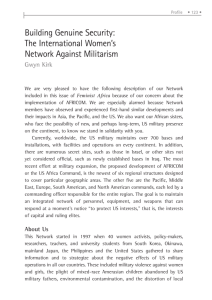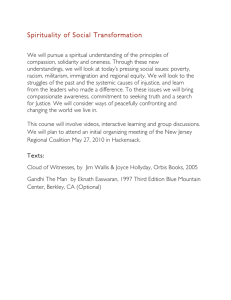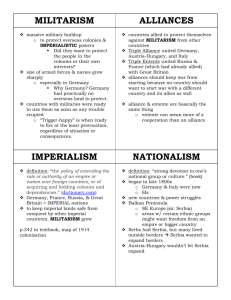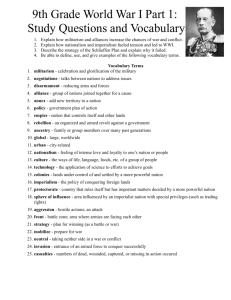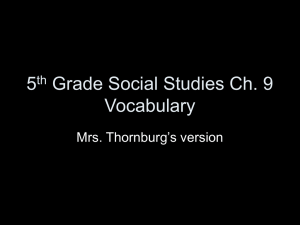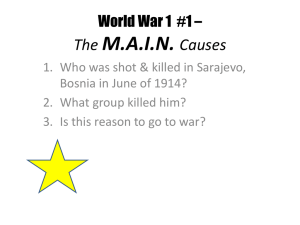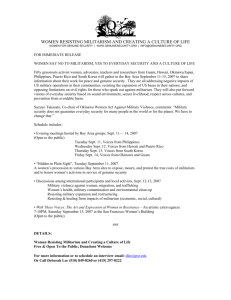Resistance, Resilience and Respect for Human Rights: Women
advertisement
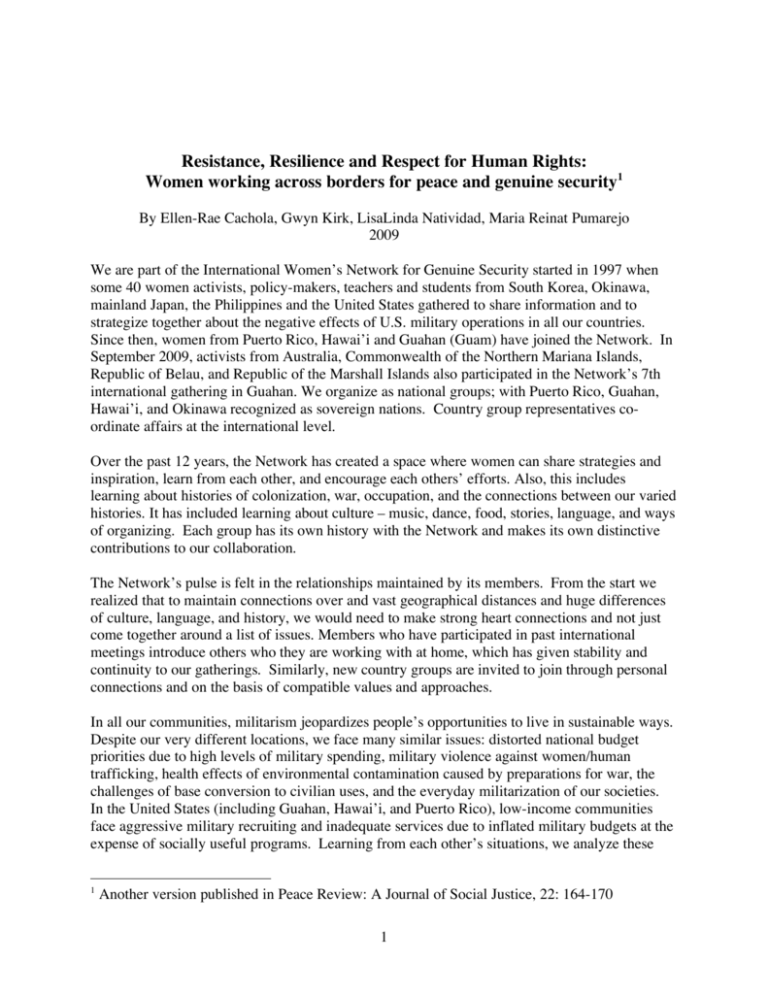
Resistance, Resilience and Respect for Human Rights: Women working across borders for peace and genuine security1 By Ellen-Rae Cachola, Gwyn Kirk, LisaLinda Natividad, Maria Reinat Pumarejo 2009 We are part of the International Women’s Network for Genuine Security started in 1997 when some 40 women activists, policy-makers, teachers and students from South Korea, Okinawa, mainland Japan, the Philippines and the United States gathered to share information and to strategize together about the negative effects of U.S. military operations in all our countries. Since then, women from Puerto Rico, Hawai’i and Guahan (Guam) have joined the Network. In September 2009, activists from Australia, Commonwealth of the Northern Mariana Islands, Republic of Belau, and Republic of the Marshall Islands also participated in the Network’s 7th international gathering in Guahan. We organize as national groups; with Puerto Rico, Guahan, Hawai’i, and Okinawa recognized as sovereign nations. Country group representatives coordinate affairs at the international level. Over the past 12 years, the Network has created a space where women can share strategies and inspiration, learn from each other, and encourage each others’ efforts. Also, this includes learning about histories of colonization, war, occupation, and the connections between our varied histories. It has included learning about culture – music, dance, food, stories, language, and ways of organizing. Each group has its own history with the Network and makes its own distinctive contributions to our collaboration. The Network’s pulse is felt in the relationships maintained by its members. From the start we realized that to maintain connections over and vast geographical distances and huge differences of culture, language, and history, we would need to make strong heart connections and not just come together around a list of issues. Members who have participated in past international meetings introduce others who they are working with at home, which has given stability and continuity to our gatherings. Similarly, new country groups are invited to join through personal connections and on the basis of compatible values and approaches. In all our communities, militarism jeopardizes people’s opportunities to live in sustainable ways. Despite our very different locations, we face many similar issues: distorted national budget priorities due to high levels of military spending, military violence against women/human trafficking, health effects of environmental contamination caused by preparations for war, the challenges of base conversion to civilian uses, and the everyday militarization of our societies. In the United States (including Guahan, Hawai’i, and Puerto Rico), low-income communities face aggressive military recruiting and inadequate services due to inflated military budgets at the expense of socially useful programs. Learning from each other’s situations, we analyze these 1 Another version published in Peace Review: A Journal of Social Justice, 22: 164-170 1 issues in terms of gender, race, class and nation. Part of our work is to redefine security, especially for women, children, and the environment. Alongside our anti-military critiques, we also envision and seek to create sustainable communities. The Network is not a membership organization but a collaboration of women active in our own communities. Activities vary from country to country and include the provision of services to victims/survivors, public education and protest, research, lobbying, litigation, promoting alternative economic development, and networking. The country groups all include skilled and experienced organizers working on the issues mentioned above. Many Network participants give talks and workshops, write popular articles, op ed pieces, and more scholarly papers. The Network includes visual artists, filmmakers, poets, writers, dancers, and performers. We see a crucial connection between the arts and action for social change. As an international network we seek to: o promote solidarity and healing among the diversity of women affected by militarism and violence; o integrate our common understandings into our relationships in the Network and in our daily lives; o promote leadership and self-determination among all the sisters of the Network; o initiate and support local and international efforts against militarism; and o strengthen our work by exploring our diverse historical, social, political, and economic experiences in each nation. The Network has also participated in international gatherings such as the Hague Appeal for Peace (Netherlands, 1999), the Grassroots Military Toxics Conference (Washington DC, 1999), the World Social Forum (India, 2004), and the national organizing conference on U.S. bases in Washington DC (2009), where we made presentations in workshops on human trafficking, environmental issues and militarism, and organizing against U.S. bases in the Asia-Pacific region. We contributed to the opening ceremony at the Pentagon and walked the runway in an anti-military fashion show. COMPLEX INEQUALITIES A key part of working together is recognizing the complex inequalities and unequal relationships among us as individuals, and among our nations. For example, Japan colonized Okinawa in 1879, Korea (1910-1945), Guahan (1941-1944), and the Philippines (1942-45). Many Koreans were forcibly drafted to work for Japanese imperial expansion – as factory workers, miners, and “comfort” women. Filipinas and Chamoru women, too, were forced to be “comfort” women. Now, Korea’s staggering post-war economic growth means that Korean companies are making money in the Philippines, alongside companies from Japan, Taiwan, Europe and the United States. Okinawa was used as a shield in World War II, to protect mainland Japan from direct U.S. invasion. Hawai’i was annexed by the United States in 1898. Guahan, Puerto Rico, and the Philippines became U.S. colonies in the same year, following the U.S. defeat of Spain. Guahan was occupied by the Japanese Imperial Army during World War II as a result of being a territory and possession of the United States. 2 These histories and inequalities may make it difficult for women from different nations to sit down together, to be able to hear what each is saying, or to trust that those with relative privilege will be their allies. As a Network of activists and scholars, we do not want to reproduce the unequal relationships that obtain among our nations. Yet, the economic and political structures that shape our lives continually recreate these inequalities. Overcoming them is an ongoing challenge and takes mindfulness and concerted effort. These inequalities are reflected in something as mundane as access to visas. Attending a Network meeting in Okinawa, for example, is straightforward for those of us with European or U.S. passports, as we do not need a visa to enter Japan. Korean women must attend an interview at the Japanese embassy in Seoul and explain the purpose of their visit. Those with Philippine passports have to queue for hours at the Japanese embassy in Manila, which is open from 2-4pm, 4 days a week. They must show a return ticket and an invitation letter from a Japanese organization. They must explain their circumstances and answer the many questions put to them by embassy staff. If successful, they must return 3 working days later to collect the visa in person. Similarly, when Network meetings are held in the United States (including a U.S. territory like Guahan) women from the Philippines must apply for a visa in person. Currently, each visa application costs $175. We have held three international meetings in the U.S. Each time, one or more women from the Philippines has had her visa application denied. Another obvious difference among us is the buying power of our currencies. U.S. dollars go a long way in the Philippines. In Japan, many everyday things are expensive, even for those of us from the States. For Filipinas, who have to change pesos into hard currency, Japanese prices are astronomical. This also affects our relative capacities regarding fundraising to cover ongoing expenses as well as to attend international gatherings. Finally, a third difference concerns the social and political risks we take in our respective countries by speaking out on these issues. Under the National Security Law, it is still illegal for Koreans to publicly oppose U.S. military policy in South Korea. They risk being labeled communist or unpatriotic, a serious charge in a context where many social activists have served jail sentences for opposing the government. The Philippines also has a particularly hostile political climate for activists, with even more human rights violations, “disappearances” and extra-judicial killings under President Gloria Macapalang Arroyo than under the military dictatorship of Ferdinand Marcos. Following the Bush administration’s declaration of a “global war on terror”, all our governments passed new anti-terrorism laws that can be used against activists. DECOLONIZING SOLIDARITY From the beginning we decided not to work only in English at international meetings as many women activists in the Asia Pacific region who are doing cutting edge work are not fluent in English. We did not want to limit participation to college-educated women able to participate in English. Currently, the Network uses five languages: English, Japanese, Korean, Spanish and Tagalog. We have a number of dedicated interpreters/translators who see interpretation as important political work. They have compiled a dictionary of over 400 terms to allow for precise, systematic translation. But working with interpretation is something we are still learning how to do well. This process can be slow and cumbersome, requiring time, patience and concentration 3 as well as skilled interpreters. Despite our best intentions, however, English is still very dominant at our international gatherings. In addition, practices of decolonizing solidarity come through sharing worldviews and building relationships. When we come together, we share issues that our local communities face, and talk about how colonialism and militarism have caused these effects both historically and currently. During international gatherings we visit military bases, war memorials and other military sites. We see these site visits to militarized localities as pilgrimages, acts of memory–making, that serve as entry points to surface and grieve repressed memories of colonialism and the traumas of war. The process of building solidarity is very important to us, because it is an ongoing challenge not to reproduce both subtle and spectacular acts of discrimination in the process of resistance. Due to the national, political, and economic inequalities among women in this Network, it has been important to explain the stratifications and complexities within our communities and locations in the world, in order to break through stereotypical assumptions that we may all have of partner countries, as well as of our own country. For example, knowledge of economic, political and social inequalities in the U.S. helps to explain why military recruitment occurs, and how the socialization and training of recruits may manifest in communities abroad during war, preparations for war, and periods of “Rest and Recreation”. Besides formal country reports and strategic planning to address systemic poverty, racism and social inequities, the women of the Network also embody ways of knowing based on indigenous and postcolonial cultural and spiritual beliefs, such as storytelling, art, poetry, dance, ritual, land-based practices, and symbol making. Despite differences of language and culture that are not completely understood across a multilingual group, the power of expressive articulation and the intentions of such messages are part of our commitment to solidarity. The courage to say what one feels among women of the Network, while immersed in hyper-military contexts, creates opportunities for individual and group-wide consciousness-raising that can begin to shift perspectives in order to undo the systematic ways that colonialism and militarism disconnect us. We are proud that this Network has kept going—and growing—these past 12 years. At the same time, our ideas, dreams, and plans are so much bigger than we have been able to manifest in practice so far. We have been supported by family and friends, as well as modest grants from foundations, churches, colleges, and community groups. Special mention should be made of The Global Fund for Women, the foundation that has supported us most consistently. As with any allvolunteer organization, our efforts tend to be uneven. Women are busy with paid work, home commitments, studying, and local projects, as well as national level work. Working at the international level can easily get squeezed out of our overfull schedules. It has taken time, commitment, respect, mindfulness, and love to maintain our connections. Together we have created a space for women and have worked hard to maintain that space. We are going against prevailing discourses and beliefs, dominant cultures and histories, including our histories of separation, inequality, suspicion, prejudice, ignorance, shame, silence and being silenced. 4 VISION AND MISSION We envision a world of genuine security based on justice, respect for others across national boundaries, and economic planning based on local people’s needs, especially the needs of women and children. Our shared mission is to build and sustain a network of women to promote, model, and protect genuine security in the face of militarism. Our goals o To contribute to the creation of societies free of militarism, violence, and all forms of sexual exploitation in order to guarantee the rights of marginalized people, particularly women and children, and to ensure the safety, well-being, and long-term sustainability of all our communities. o To strengthen our common consciousness and voice by sharing experiences and making connections among militarism, imperialism, and systems of oppression and exploitation based on gender race, class and nation. Together, we address the challenge of how to link these separate efforts, which each focus on small parts of the military system. We do it in the following ways o International meetings, o Facilitating links among country groups, o Coordinated activities, o Supporting each others’ individual activities and campaigns through letters, donations, selling goods, o Educating people in our communities about how US militarism impacts women, children, and the environment in other countries of the Network, and through o Writing, talks and presentations. 7TH INTERNATIONAL MEETING The Network came together from across the ocean to meet in Guahan (Guam) from September 14-19, 2009, with the theme: “Resistance, Resilience, and Respect for Human Rights.” Guahan Network sisters offered to host the meeting in light of the unprecedented U.S. military expansion planned for the island, which is known as the “Tip of the Spear” of U.S. military might. In attendance were 62 delegates from 12 countries, as well as women of Guahan. The conference was an opportunity for Network sisters to share her-stories of colonization, militarism, and strategies of resistance. Further, specific areas of conversation included: redefining concepts of security, human trafficking of women, alternatives to military economies, reclaiming physical environments, and promoting security for women and children. The week also showcased a round-the-island tour, a Peace Walk protest, a public forum, and time at the beach, where we participated in a healing ritual including the burning of the Treaty of Paris, which dates back to the end of the Spanish-American War in 1898. The meeting provided a space for women to share their personal encounters with militarism as sisters seeking to create sustainable lives for their communities. It allowed Network members to regroup and examine our purpose and future directions in resisting militarism and its negative impacts on all our nations. 5 Future growth for International Women’s Network involves o Better communication among our country groups, o Deepening our understanding of the issues and how to address them, o More country to country connections and activities, o More Network-wide activities, o Expanding the Network by building relationships with other country networks and communities grappling with related issues such as environmental injustice and aggressive development, and\ o Being able to support a Network secretariat with paid staff time. A U.S. Department of Defense web site described the Pentagon as the “oldest,” “largest,” “busiest,” and “most successful” U.S. company, boasting a budget bigger than ExxonMobil, Ford, or General Motors, and with wider geographical reach (U.S. Department of Defense 2002). Indeed, the United States maintains around 1,000 military bases worldwide, on all continents, with the consent—whether by flattery, bribery, bullying, or coercion – of “host” governments. However, it is clear to many people that neither capitalism nor militarism can guarantee genuine security for the majority of the world’s population or for the planet itself. To challenge – and ultimately to end -- U.S. military empire will require more strong networks of activists and scholars, to develop shared analyses, and generate –-or restore–-alternative definitions of a genuinely secure and sustainable future, based on sturdy connections among people that both acknowledge and go beyond narrow identities and territories. FOR MORE INFORMATION o www.genuinesecurity.org o “Gender and U.S. Bases in the Asia-Pacific Region,” by Ellen-Rae Cachola, Lizelle Festejo, Annie Fukushima, Gwyn Kirk, and Sabina Perez. Foreign Policy in Focus: www.fpif.org/fpiftxt/5069 o “Fashioning Resistance to Militarism,” by Christine Ahn and Gwyn Kirk. Foreign Policy in Focus: www.fpif.org/fpiftxt/5929 o “Living Along the Fenceline: Women Resisting Militarism and Creating a Culture of Life,” a film by Lina Hoshino – see website for details. 6

